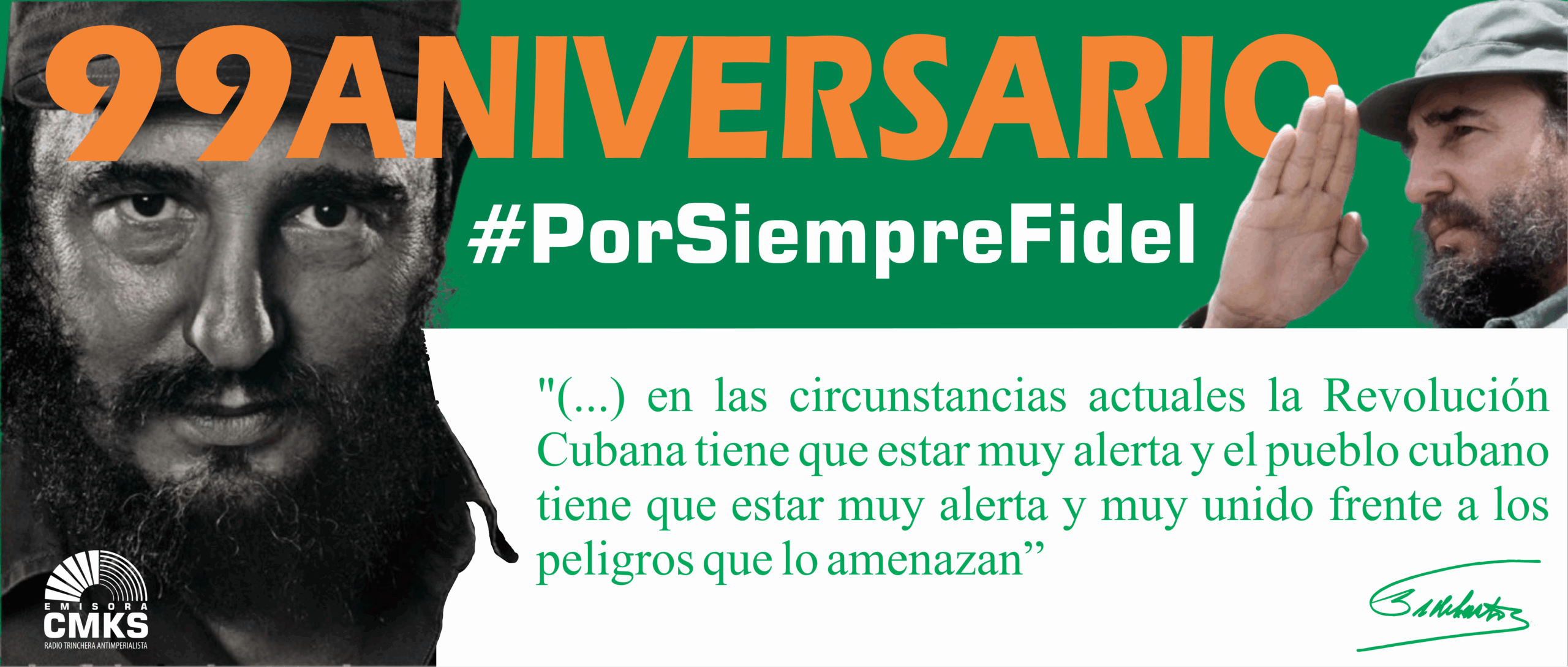 Guantanamo.- There is luminosity on every August 13th that can never be extinguished, not even with all the blockades in the world, for it is the date of the happy birthday of the undefeated leader of the Cuban Revolution, Fidel Castro Ruz, 99 years ago.
Guantanamo.- There is luminosity on every August 13th that can never be extinguished, not even with all the blockades in the world, for it is the date of the happy birthday of the undefeated leader of the Cuban Revolution, Fidel Castro Ruz, 99 years ago.
Even afterward, when his compatriots cried out in his painful physical farewell: “I am Fidel,” the enormous challenge of continuing to be guided by that light, self-imposed by homage and deep convictions, emanating from his flagship flag, became clear.
On days like these, Cubans decisively go beyond the ceremonies at the altar of the Homeland and the public acts and rituals, performed because they are beautiful and uplifting.
To achieve this, many try to take on the arduous challenge of working on the intimate Fidel that each of us must carry within, going beyond slogans and cliches and transforming his teachings into creative action.
This land sons have always dedicated themselves more to heroic deeds, even at the cost of their lives, in the heat of the most just battles, than to the calm necessary for the fulfillment of duty in peaceful everyday life.
The spirit of a fiery blood and a culture with deeply rooted values, in favor of freedom and justice, are thought to define us as a people.
Who doesn’t remember the Commander-in-Chief of the Rebel Army when he affirmed that this would indeed be the true Revolution, on January 1, 1959, in Santiago de Cuba, after the victory?
And when he later said, on January 8, in Havana, that things could be more difficult from now on, and also warned, amid the immense jubilation, that we should beware of our own mistakes.
The Fidel who always made it clear to the enemies of the Revolution that there would never be surrender, and who led Cubans in so many heroic battles amid great achievements, now also calls on them to continue working harder from within to improve themselves, the greatest challenge any human being can take on.
A worthy endeavor despite everything, for Cuba has more than enough spiritual, intellectual, moral, and character reserves to do so.
The grateful and even the ungrateful multitudes know well, deep in their hearts, how decisive the Leader’s contribution was to social equality and to creating the foundations for his people to be educated, cultured, and instructed in general education, science, and technology.
The fulfillment of duty then prevails, that task less noisy and visible than frontal battles, which are also necessary, and which require perseverance, endless dedication, and dedication of body and soul, knowing that it is the only way to move forward and guarantee the continuity of the model of society we have chosen.
A pressing demand in times of the fiercest blockade any country has ever known, as is well known.
We owe it to you, Fidel, and to us. It’s good to remember your birthplace again, amidst the relevance of your life’s work and the fond memories.
Fidel’s life is an inspiring example: a revolutionary who forged himself as a fighter for the most just causes and had in his family, especially his father Angel Castro and his mother Lina Ruz, two pillars of such precious wood.
He was born in the rural town of Biran, in the former province of Oriente, now part of the northeastern province of Holguin.He earned excellent grades and always excelled from elementary school onwards, receiving much of his education in Santiago de Cuba, although he completed his high school studies at the Colegio de Belen in Havana.
He enrolled in law school at the University of Havana in 1945, after completing his studies at the city’s Jesuit institution with distinction.
He would always remember the role that institution played in developing his revolutionary consciousness and political thinking.
It was a period of intense action, during which he suffered beatings in the streets and arbitrary arrests, and during which he also came into contact with Marxist ideology. During this time, he began his vocation for Latin American solidarity, born from his deep admiration for the work of Jose Marti, one of his great moral mentors, and his study of Simon Bolivar.
He was also active in the Partido del Pueblo, known as the Orthodox Party.
After graduating as a lawyer, with two degrees in legal disciplines, he chose to establish himself in a law firm dedicated to helping the poor.
His first combative moments occurred during the confrontation with President Ramon Grau San Martin. The coup d’état of Fulgencio Batista in 1952 marked the coming of age of his convictions and the radicalization and deepening of his revolutionary thinking.
Beginning in 1953, came the attacks on the Moncada and Carlos Manuel de Cespedes barracks, the historic July 26th of that year, the unjust but fruitful imprisonment, the amnesty in 1955, the forced exile in Mexico, and the final return to fight in the Sierra Maestra, where he arrived after a hazardous journey with 82 expeditionaries on December 2, 1956.
From that heroic bastion, within two years the insurrection descended to the plains and spread throughout Cuba.
The great epic poem led by Fidel, at the head of the glorious Rebel Army, deserves a separate space.
The challenging, beautiful, founding, and ever-transforming task of the Cuban Revolution, right in the face of the most powerful enemy on Earth, consecrated him before his compatriots, who, recalling the Apostle, confirm: “Death is not true when life’s work has been well done.”